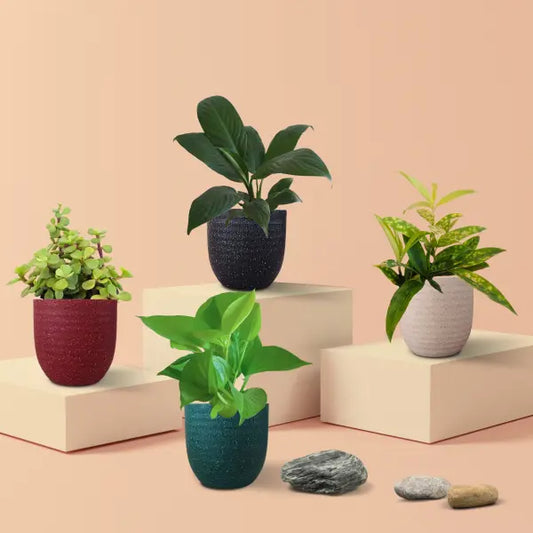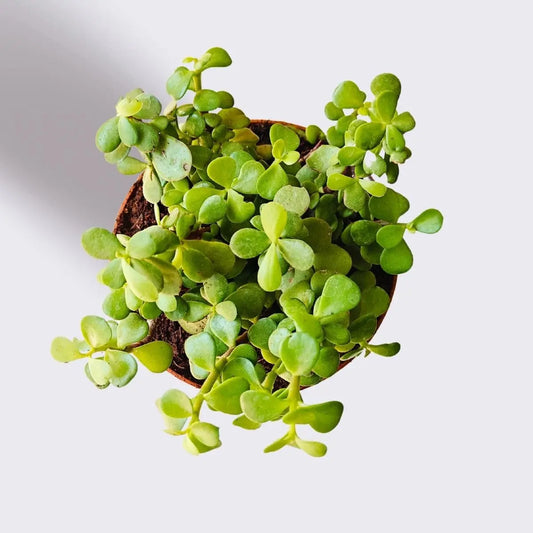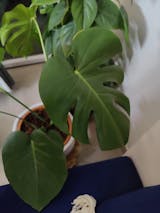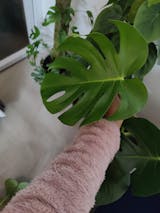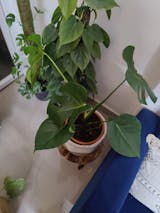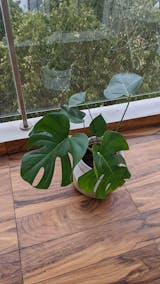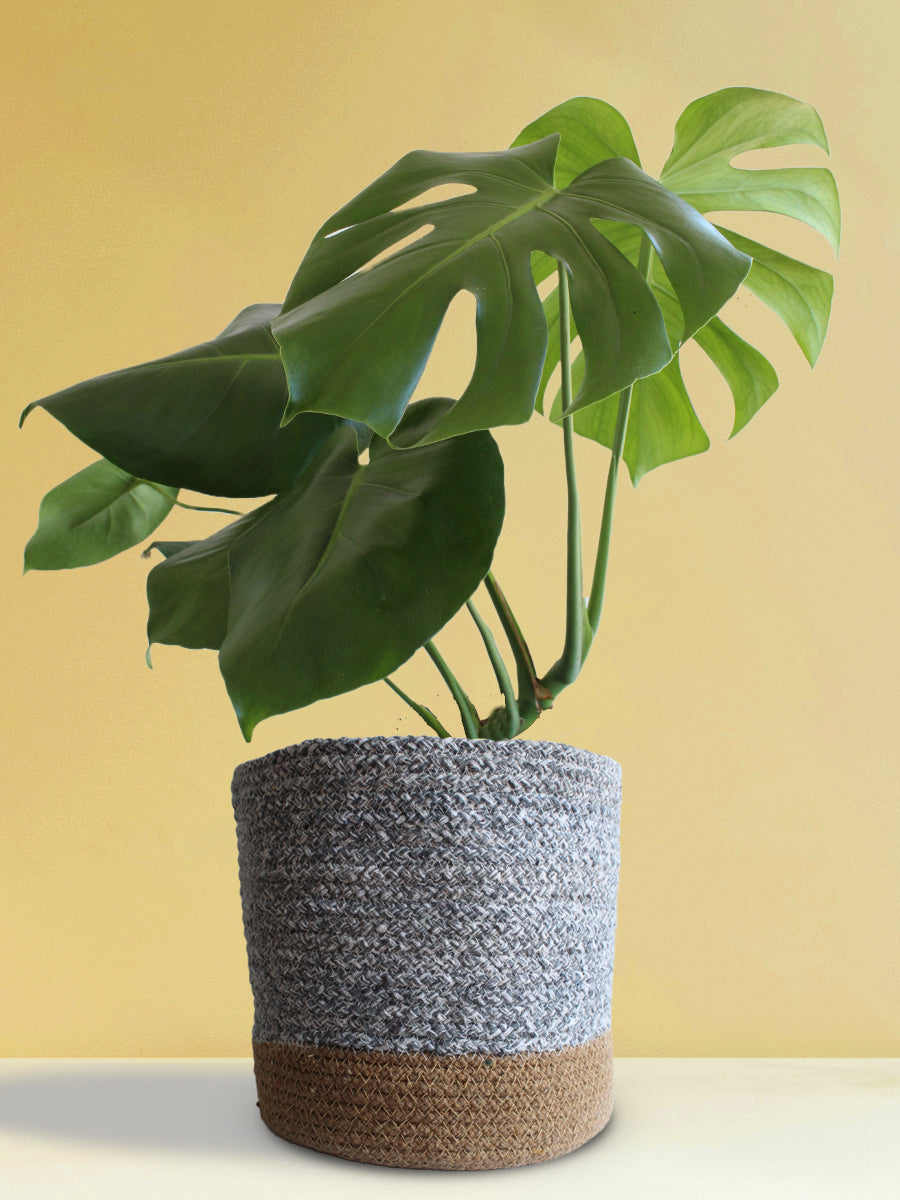
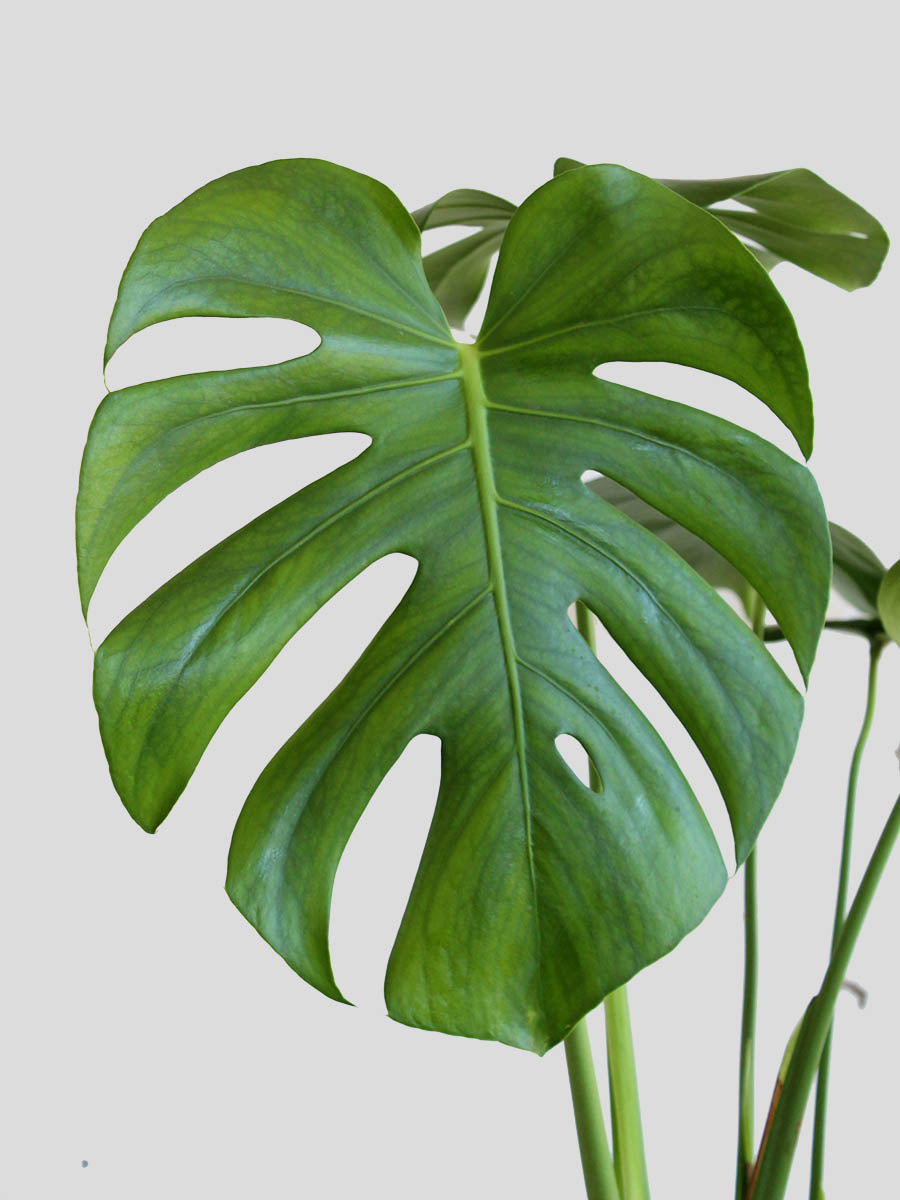
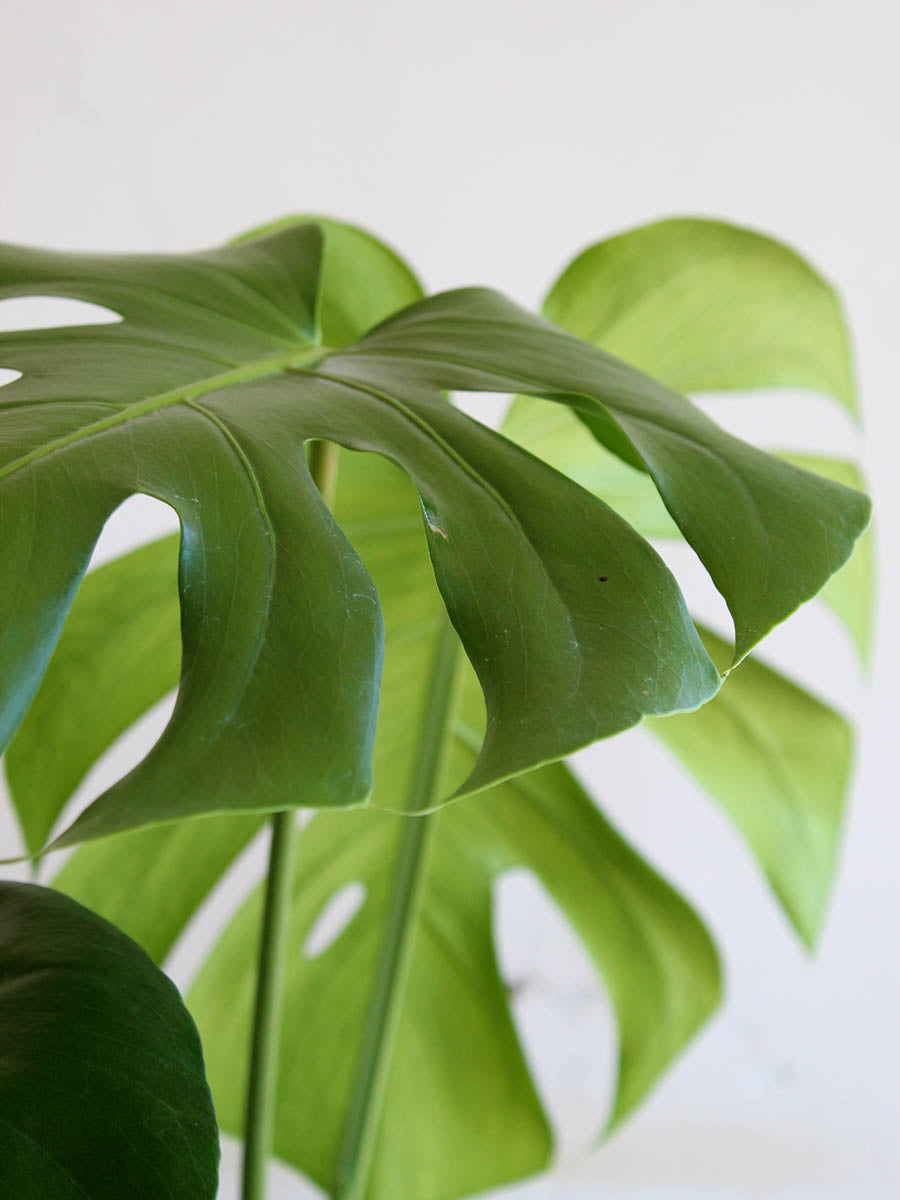
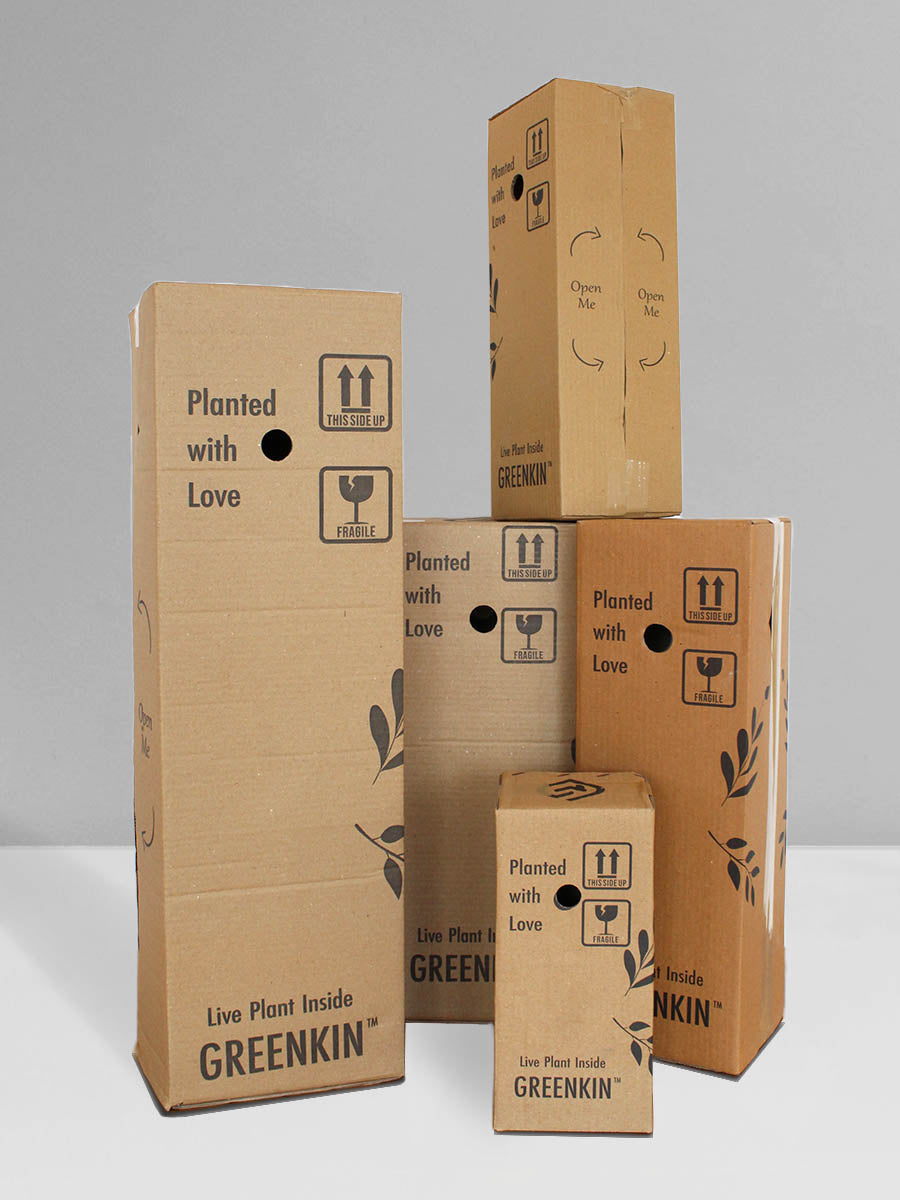
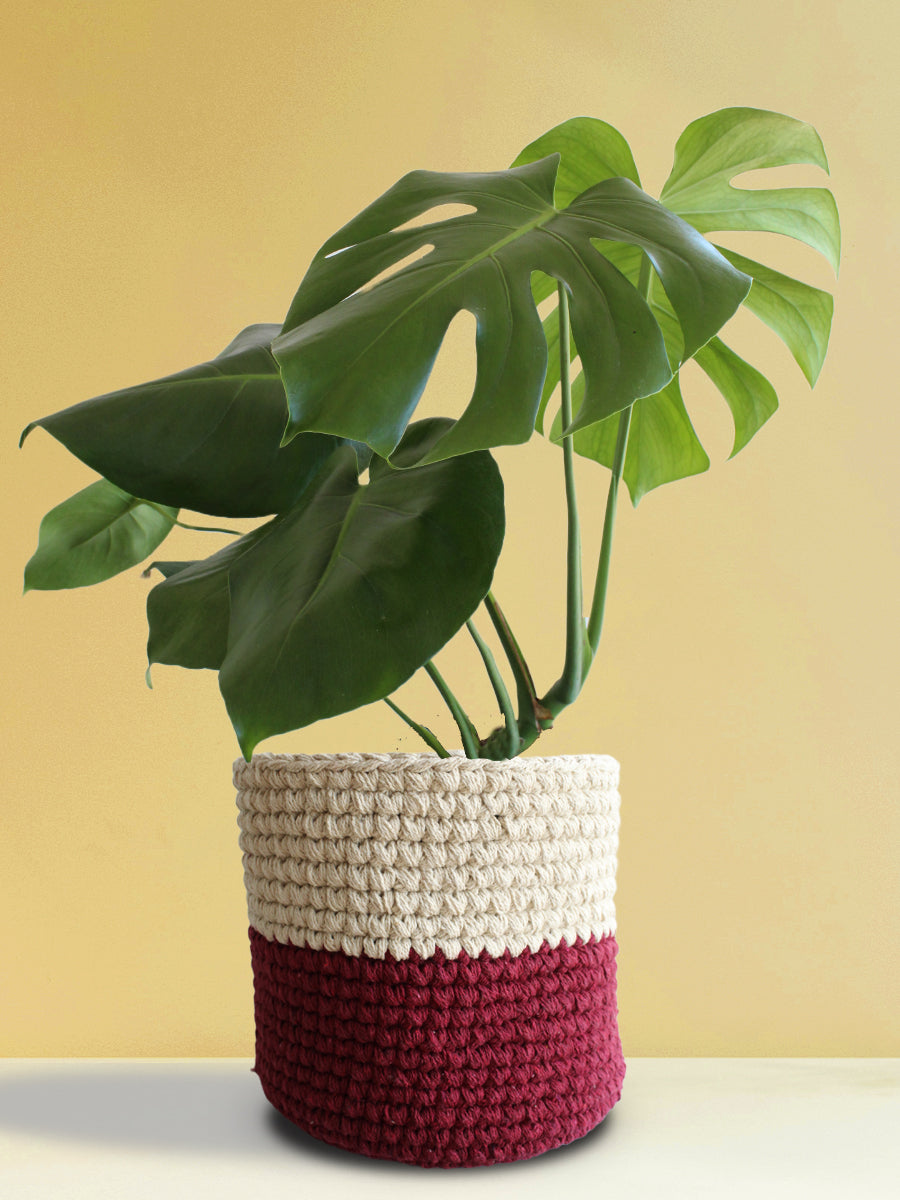
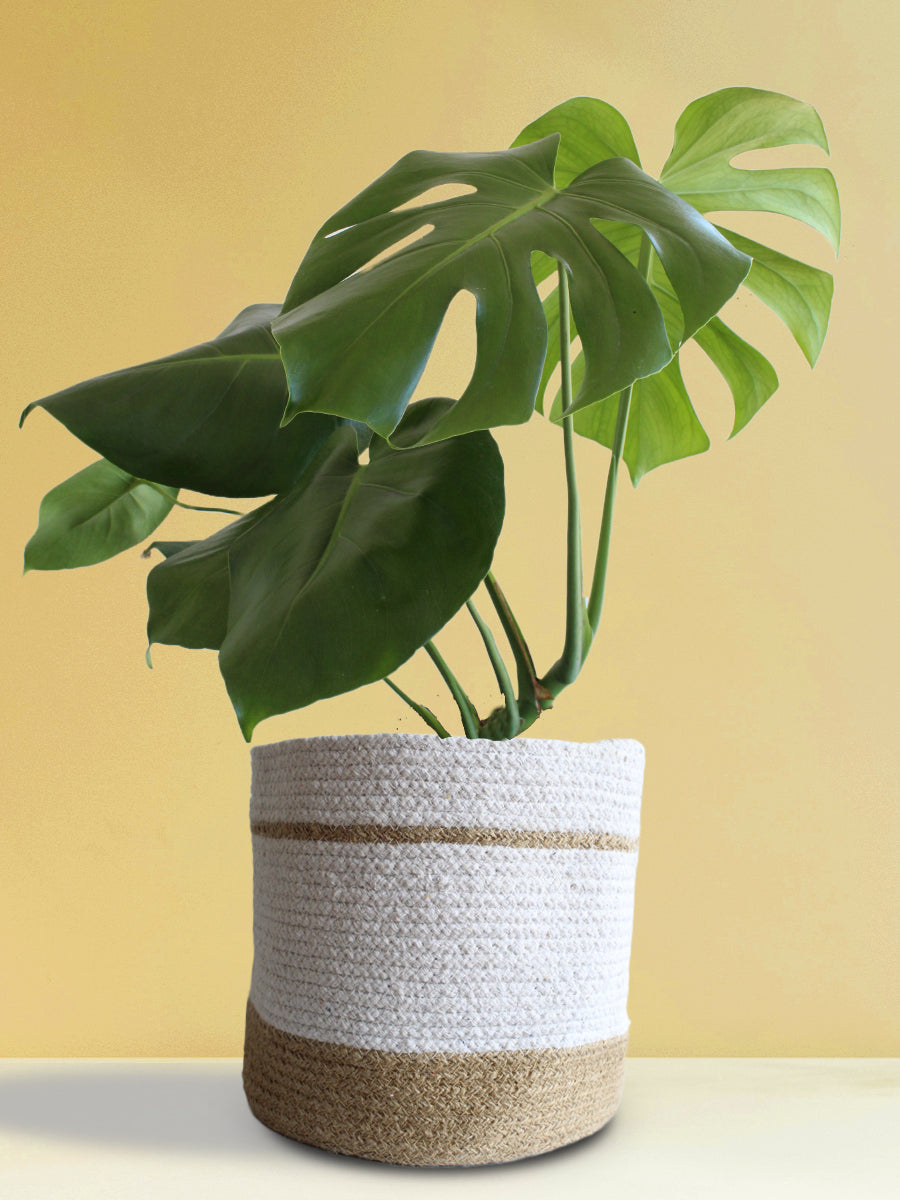
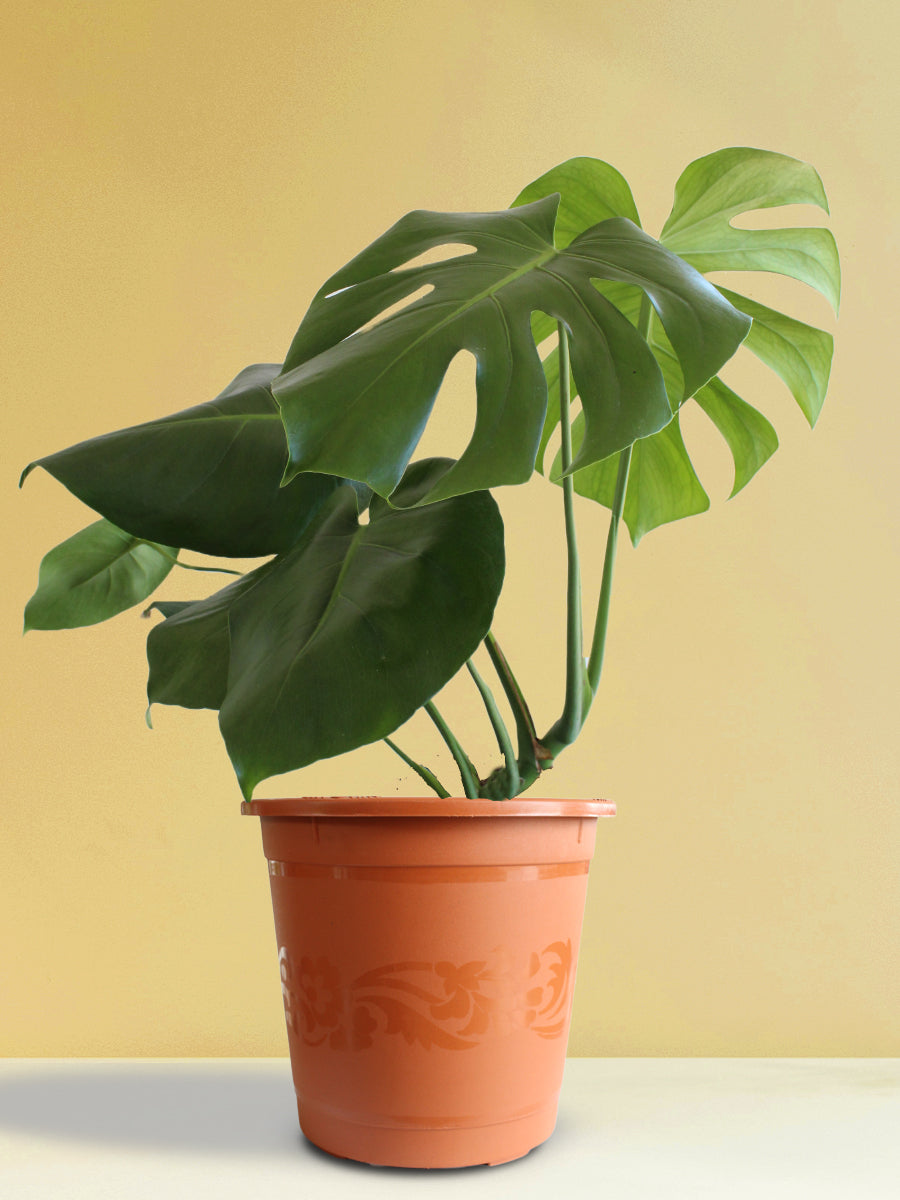
Size Guide
25,000+ Smiles Delivered
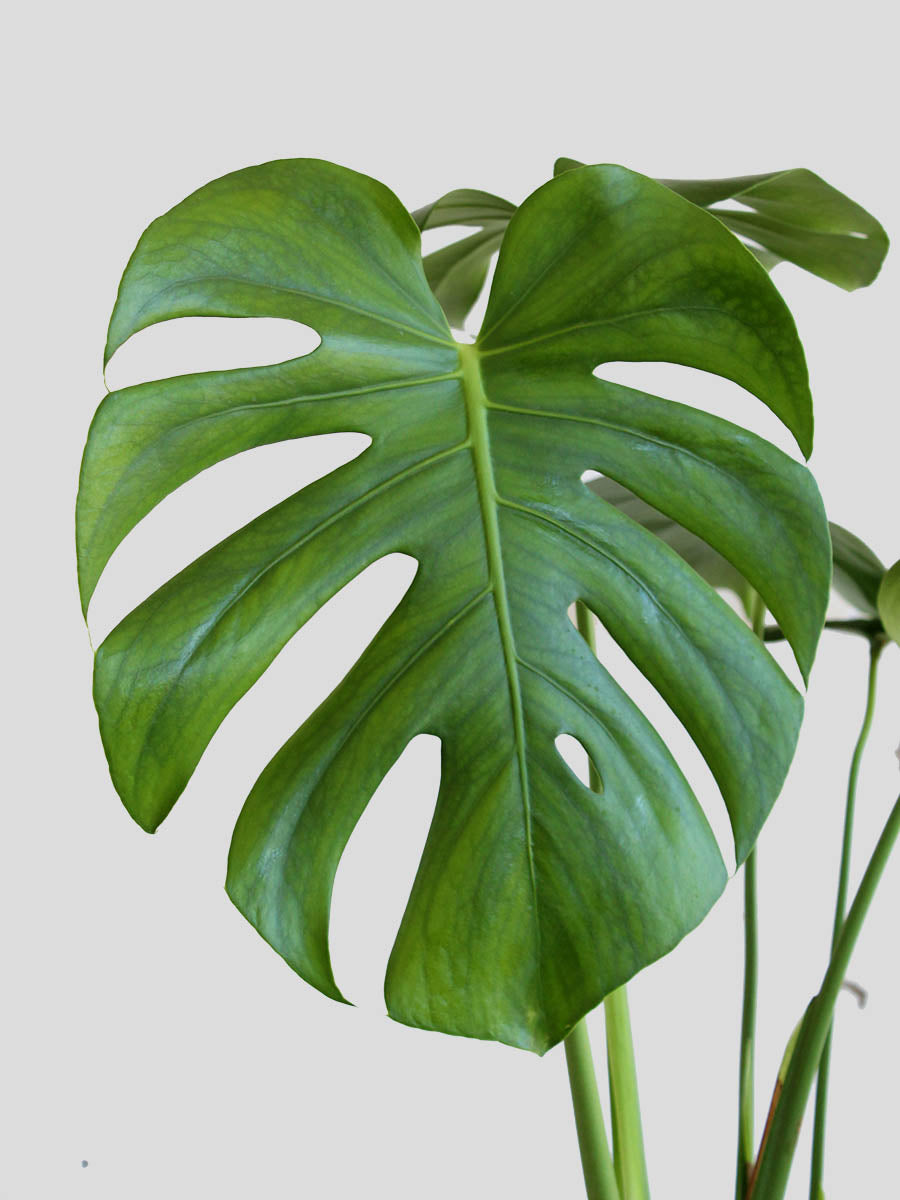
About Monstera Deliciosa (X-Large)
Also Known As
Also Known As
Swiss Cheese Plant, Split-Leaf Philodendron
Keep In Mind
Keep In Mind
The Trending 25
Shop our Bestsellers - The plants that everyone is buying
-
Indoor Plants Combo for Home Decor in Eco Pots (Small)
Regular price ₹ 1,199Regular priceUnit price per₹ 2,199Sale price ₹ 1,199Sale -
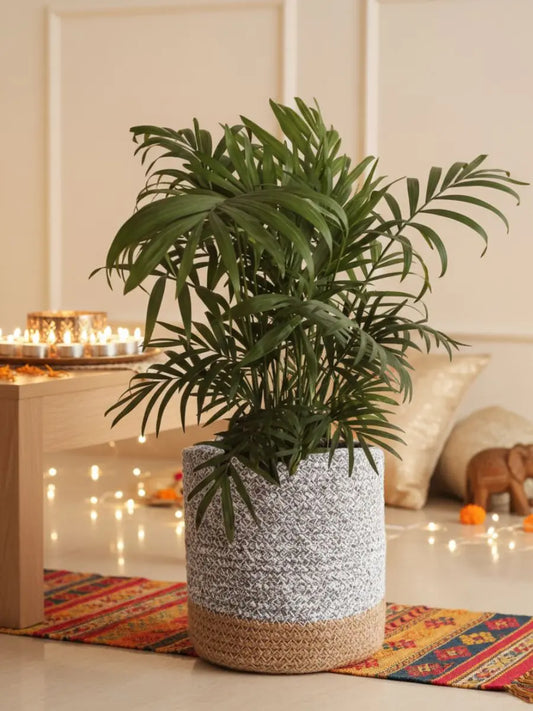
 25% Off
25% OffBamboo Palm (Large)
Regular price From ₹ 899Regular priceUnit price per₹ 1,199Sale price From ₹ 899Sale -
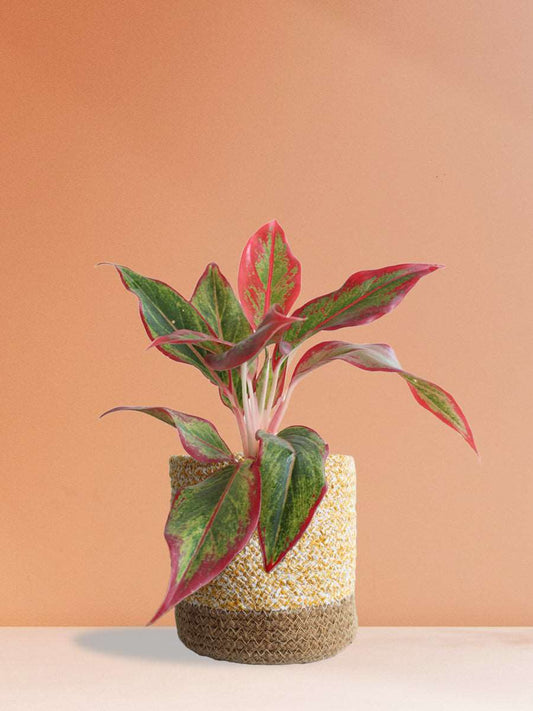
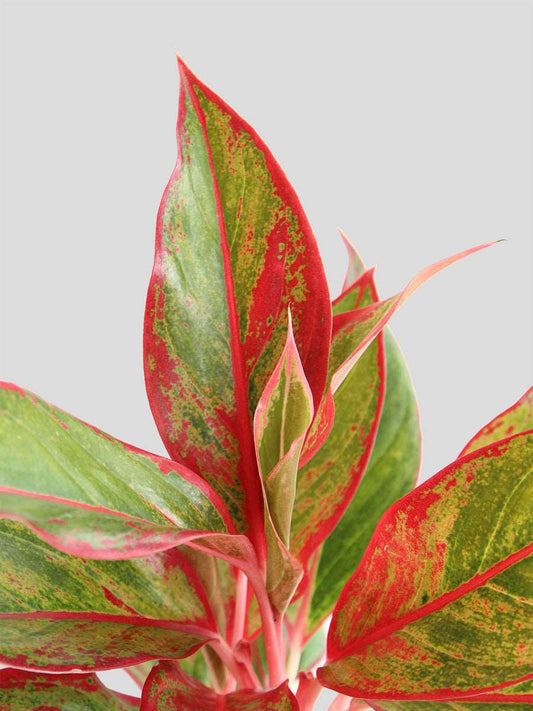 37% Off
37% OffAglaonema Red Lipstick (Medium)
Regular price From ₹ 499Regular priceUnit price per₹ 799Sale price From ₹ 499Sale -
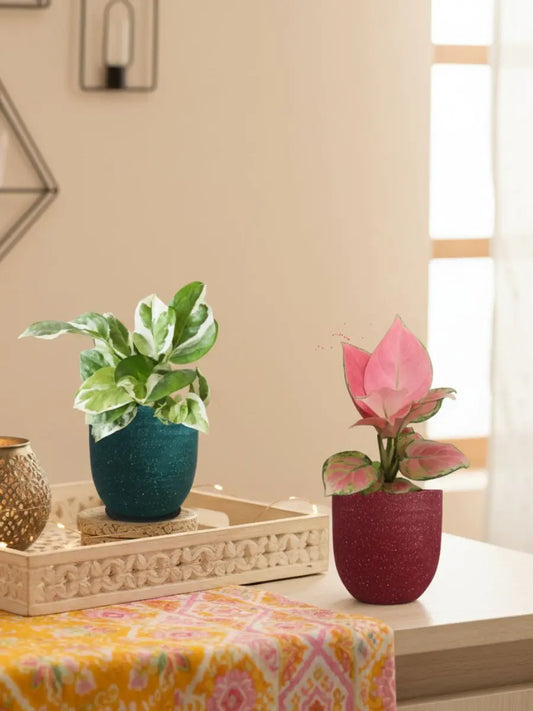
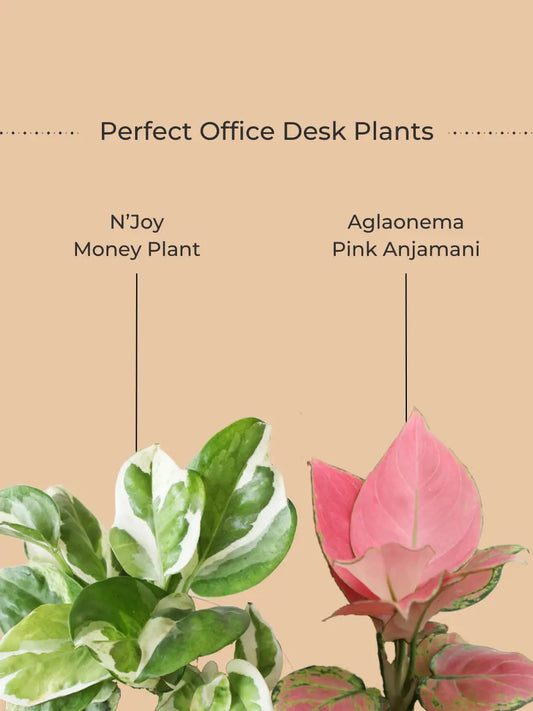 25% Off
25% OffOffice Desk Plants Combo (Small)
Regular price ₹ 936Regular priceUnit price per₹ 1,249Sale price ₹ 936Sale
Buy Monstera Deliciosa (X-Large) Online
Keep reading to discover more about Monstera Deliciosa plant characteristics, features, benefits, recommendations to place in your living space and care guides for aesthetically pleasing throughout the year.
History of Monstera Deliciosa
The history of the monstera deliciosa, or "costilla de adán," is as interesting as the plant itself. It was in the 16th century when European explorers in the central and southern American tropical rainforests made their initial discovery. Traditional knowledge of the plant led to its name, "Costilla de adán", meaning "adam's rib" in English, which reflects the ribbed shape of its leaves.
Characteristics Features of Monstera Deliciosa
The Monstera deliciosa plant grows naturally in Central and South America, where it is as tall as it is beautiful, with heart-shaped, huge, leathery leaves. As they grow, young leaves split and hole. The leaves have holes within slits or vice versa. This plant's spadix and spathe, which don't seem like a "flower" in a normal flower arrangement, make Monstera deliciosa unique. The name is derived from the fact that the fruit of this plant is a natural dessert for woodland creatures, such as primate species.
Interesting Facts About Monstera Deliciosa
There are many interesting facts about this beautiful plant. Monstera Deliciosa has become a must-have houseplant for a reason!
- During the initial stages of unfurling, the leaves of the Monstera deliciosa plant do not exhibit the form for which it is renowned. Rather, the leaves are tightly curled and gradually unfold as they mature. Because of this process, the name Swiss-cheese plant becomes an aesthetically pleasing houseplant.
- The Monstera deliciosa called 'Swiss cheese plant' is named for a reason. Large, glossy leaves that can grow to 2 feet long with fenestrations. This plant lives in the rainforest understory, and its holes help light reach its bottom leaves. Monsteras maintained indoors (or out of the rainforest) develop more leaf holes. The holes make the leaves look like cheesy cheese, hence the name.
- Fun fact: Ripe monstera deliciosa fruit can be eaten. Monstera deliciosa produces edible pineapple-like fruit. The fruit of Monstera deliciosa is elongated, up to 25 cm long, and resembles a corn cob, but it is coated with a leathery shell composed from spadix scales. This shell would fall off when the fruit ripens. It tastes like a pineapple-banana mix. The flavour is similar to mango. The fully ripened fruit is safe to eat, although it may have a lot of calcium oxalate crystals in its flesh, which can cause oral discomfort in sensitive persons.
- Monstera deliciosa rarely flowers indoors. Under certain conditions, this unusual event can occur. They resemble calla lilies with white blossoms. Monstera deliciosa blooms when cared for properly.
Buy Monstera Deliciosa Plant online
Seeking a unique form and visual appearance plant for your interior decor? Then, choose the Monstera deliciosa plant. Many people adore Monstera deliciosa because of its striking appearance and distinctive form of beautiful deep green, fenestrated leaves on its edges. When grown in gardens (outdoor) and homes (indoor) in humid, temperate zones, M. deliciosa's distinctive deeply lobed, hole-filled leaves offer a fairly attractive visual. Last but not least, Monstera deliciosa plant is a thoughtful, appealing, memorable, and everlasting gift for houseplant beginners and experts. The Monstera deliciosa plant is considered to offer prosperity as well as beauty to a space. So why wait? Order your Monstera Deliciosa now!
Why Choose Greenkin to Buy Monstera Deliciosa Plant
Greenkin is among the most trusted online plant shop destinations among plant enthusiasts. We offer Monstera Deliciosa (in a 9-inch planter and 8-inch grow pot). Each Monstera Deliciosa plant order comes with a premium soil mix to ensure vigorous and healthy growth. Moreover, the "Swiss cheese plant," Monstera deliciosa, is a gorgeous houseplant that never fails to wow. People who don't have a green thumb but still desire an indoor jungle often choose this plant because of its attractive appearance and reputation for being almost hard to kill. Furthermore, Greenkin each plant is carefully examined to ensure its overall health before it gets shipped. Plus, the plants are carefully packed to avoid damage during shipment.
Things to Consider Before Buying Monstera Deliciosa Plant
Before buying a low-maintenance plant like Monstera Deliciosa, there are a few important factors to consider:
- Lighting Consideration: Medium to high indirect light suits the plant. It can survive low light but may not grow. Also, it's important to avoid placing it in a spot where the sun can directly hit it, especially if the plant is in a container that doesn't give its leaves many places to hide and those few exposed leaves can get sunburned.
- Space Consideration: Monstera Deliciosa can grow to 12 feet indoors. Don't worry if your Monstera plant isn’t as tall, the average height is 3 to 5 feet. Consider where this tropical plant will live since it doesn't "live small, die small".
- Pet Safety Around Monstera Deliciosa: Monstera deliciosa is considered toxic if consumed, so be cautious if you have cats or dogs around. Although it is appealing to both pets and humans, it should always be kept away from both children and pets.
Benefits of Having Monstera Deliciosa Plant at Home
Besides its aesthetical beauty, Monstera Deliciosa Plant offers many benefits such as:
- Health Benefits of Having Monstera Deliciosa Plant at Home: The Monstera deliciosa is just decorative, yet the soothing effect of its green foliage makes people feel at ease. Its natural vibe emphasises nature's connection. Importantly, NASA's 1989 two-year study demonstrated that the Monstera plant removes formaldehyde, benzene, trichloroethylene, and other indoor air pollutants. Its large, shiny leaves have a large surface area to absorb these contaminants. This makes the air around it cleaner , which is indirectly linked to a better mood and a healthy lifestyle.
- Vastu Benefits of Having Monstera Deliciosa Plant at Home: Feng Shui and Vastu Shastra state that Monstera Deliciosa creates a positive, healthy home. The plant's large leaves symbolise luck, wealth, and growth entering the home. Moreover, it makes a building look green and increases natural light. However, seeing the green, fresh plant makes people happy. According to Feng Shui, Monstera deliciosa or any large-leafed plant should be placed in the front entrance, living room , and kitchen. Plants help direct yin and yang energy in a healthy and auspicious way.
Uses of Monstera Deliciosa Plant
Apart from its natural beauty, health benefits, and vastu benefits, Monstera Deliciosa Plant brings more to the table. Here are a few uses of this marvellous plant:
- Use as an aesthetically appealing plant decor: Adam's Rib Plant, or Monstera deliciosa, is a popular houseplant due to its distinctive shape and appearance. It is a beautiful plant that grows well indoors and outdoors . If cared for, it can become a "delicious monster".
- Use in culinary: Monstrosa deliciosa, often called the "king of fruits'' due to its sugary flavour, has ripe fruits that taste like a combination of mango, pineapple, and banana. Raw or cooked, Monstera deliciosa adds a tropical touch dish. Its luscious fruits are perfect for making drinks, salads, smoothies, and sweets.
- Use as a decorative material: The aerial roots of Monstera deliciosa are valuable and ornamentally planted. In many different cultures, they are also used to make baskets and ropes.
- Traditionally used as a medicine: The aerial root was traditionally used as a snakebite antidote in Martinique and as an arthritis reliever in Mexico.
Placement Guide for Monstera Deliciosa Plant
To ensure that your Monstera Deliciosa plant thrives well, follow the below guidelines for plant placement:
- Place your plant indoors in a location with medium to bright indirect light, such as next to a window that receives filtered sunlight. Direct sunlight may cause leaf burn on your plant.
- When placing plants in outdoor space, select a spot that is shaded that will reduce the heat and wind stress and block the sun's harshest rays.
- As a tropical plant, placing the plant in a humid room, such as a bathroom or kitchen is best. However, you can use a humidifier for another room for placing the plant if necessary to prevent it from becoming too dry.
How to Care for Monstera Deliciosa Plant
Monstera plants are easy to care for because they thrive in any environment. However, follow these basic care instructions for optimal growth:
- Lighting Requirements of Monstera Deliciosa Plant: Monstera deliciosa prefers bright, indirect sunlight. Its leaves are sensitive to direct sunlight, so set your plant in sunlight in cooler months only. Remember that Monsteras thrive in medium to low light. However, too much low light can make this plant lanky and reduce its Swiss-cheese patterns.
- Watering Requirements of Monstera Deliciosa Plant: When the top 2–3 inches of soil are dry, water your Monstera deliciosa plant. Moreover, water it thoroughly to reach the root system and help it drain out the pot's bottom to avoid sitting in water. Furthermore, reduce watering in winter (due to plant dormancy period) and let the soil dry out longer. Underwatering the plant may cause weak, curled, or crunchy leaves. If Monstera deliciosa plant leaves turn dry or yellow, you have overwatered causing root rot.
- Humidity Requirements of Monstera Deliciosa Plant: Monstera deliciosa doesn't mind low humidity but grows faster and fuller in high humidity. As a tropical plant, Monstera deliciosa likes 60% humidity. This can be done with a humidifier or a pebble-lined tray to prevent drying. Moreover, when a Monstera deliciosa gets dry or heated, its leaves shift perpendicular to the petiole.
- Temperature Requirements for Monstera Deliciosa Plant: Monstera deliciosa plant prefers 65°F to 85°F. Although it can withstand temperatures as high as 90°F and as low as 50°F, growth will slow down in both settings. For optimal results, keep it away from drafts, air conditioning, and heating units.
- How often should fertilizers be used for Monstera Deliciosa Plants: Give the plant a balanced liquid fertiliser during the growing season. The fertiliser should have 20-20-20 nitrogen, phosphorus, and potassium. Additionally, try watering the plant with this fertiliser solution instead of water.
- Soil Requirements of Monstera Deliciosa Plant: A well-draining, light, mainly peat combination with chunky perlite and woodsy orchid bark is desirable for the Monstera deliciosa plant.
- Repotting a Monstera Deliciosa Plant: Every few years, Monstera deliciosa plants need repotting. Repot your Monstera plant in a pot that's one to two inches larger than its current pot.
- Is Pruning Needed for Monstera Deliciosa Plants: Pruning is mostly done to control the size of the plant. For the plant's new, healthy growth, dead and damaged leaves must be pruned periodically.
- Disease Management for Monstera Deliciosa Plant: Monitoring root rot, powdery mildew, and leaf spots is essential for disease management. Root rot occurs when it is overwatered or grown in unhealthy soil. Poor air circulation and humidity cause powdery mildew, whereas high humidity and uneven watering cause leaf spots. If you discover signs of these diseases, cut off and properly get rid of the damaged plant parts, mostly the leaves. Additionally, to avoid lair infections, plants should be kept moist yet well-drained with excellent airflow.
- Monstera Deliciosa Plant Pet Safety Guide: Monstera deliciosa can be toxic to humans and pets if consumed. The reason behind its toxicity is that the plant contains calcium oxalate crystals, which are insoluble, all over its parts but notably in the centre stalk and at the bases of its leaves. Therefore, make sure to keep the plant away from the reach of children and pets.
- Dusting a Monstera Deliciosa Plant: Dusting leaves keeps them healthy and repels bugs. Use a moist cloth to clean leaves regularly.
FAQ
Monstera deliciosa, also known as the Swiss Cheese Plant or Split-Leaf Philodendron, is a tropical plant native to Central and South America. It is a popular houseplant with large, fenestrated leaves.
The Monstera deliciosa plant has leaf fenestration. Leaf fenestration refers to holes or splits in some plants' leaves, such as Monstera deliciosa. This unique leaf feature makes the Monstera deliciosa plant a beautiful and hardy houseplant.
Monstera deliciosa is native to the tropical rainforests of Central and South America. Additionally, this plant grows as a climbing vine.
Yes, indeed. Monstera deliciosa is a low-maintenance, hardy, and adaptable plant that thrives in indirect sunlight to deep shade. This makes it ideal for most gardens. It likes humidity, but not too much.
Monstera deliciosa loves indirect light ranging from medium to bright. It can survive in low light, but it's beautiful leaves won't unfurl and exhibit their holes.
Yes, Monstera deliciosa thrives in low light. New growth will occur, but the plant's rate of growth and the size of its leaves may slow down. Also, its striking leaves will not unfold and reveal all of its attractive holes. Thus, moving your Monstera to a brighter spot is best for boosting its attractive leaf pattern growth.
Water Monstera deliciosa when the first inch of soil dries. This rule of thumb requires regular watering, but indoor moisture and seasonal changes may require adjustments. However, avoid overwatering this plant to prevent root rot.
Take stem cuttings with at least one node and an aerial root for propagation of Monstera deliciosa. After that, put them in water or soil for optimal growth.
Monstera deliciosa prefers medium-to-high humidity (approximately 60%). To maintain humidity during a drought, mist the plant or use a humidifier.
Monstera deliciosa performs best at temperatures ranging from 65°F to 90°F (18°C to 32°C). It is important to keep it away from cold drafts or extreme temperature changes.
Monstera Deliciosa leaves can be yellow for various reasons. Simple overwatering or long-term wet soil can cause yellow leaves and root rot. Also, poor soil drainage is one of the main causes. Thus, between waterings, let the soil dry out to an inch.
If we take precautions, yes. Remember that Monstera is a tropical plant that thrives in shade and can grow large under the right conditions.
A Monstera deliciosa should be fed a balanced, water-soluble fertiliser monthly in spring and summer (during the active growth stage).
Monstera deliciosa can cause mild poisoning in pets, causing mouth irritation, excessive salivation, and swallowing issues. This is because of the presence of calcium oxalate crystals in the centre stalk and at the bases of Monstera deliciosa plant leaves.
According to Feng Shui and Vastu Shastra, Monstera Deliciosa's huge leaves signify luck, wealth, and growth. Feng Shui recommends placing Monstera deliciosa or any large-leafed plant in the front entrance, living room, and kitchen to direct yin and yang energy in a healthy and fortunate way.
Cut back leggy growth or remove yellow or damaged leaves of the Monstera Deliciosa plant to prune. Use clean, sharp scissors or pruning shears for the best results.
Small leaves on a Monstera usually indicate one of two things: either not enough light or not enough nutrients. For optimal growth, give the plant an adequate light spot and a timely balance of fertiliser feed (probably during the active growth period).
Monstera deliciosa should be repotted every two to three years or when pot-bound. Choose a pot one size larger than the old one with drainage holes when repotting.
The most common culprits are spider mites, scales, and mealybugs, but others can appear. It is prudent to take routine examinations. If you find an infestation, spray the pests with soapy or neem water.
To remove dust and let chloroplasts make solar energy, gently wipe leaves with a damp cloth. Monstera deliciosa is strong, but its leaves can tear if pulled too hard.
Drainage-friendly potting mix is best. Peat moss, perlite, and compost work well. Consequently, the mix will provide adequate aeration and moisture to the plant's roots.
Yes, it can! Basically, it prefers bright, indirect natural light. Natural light isn't always available. If you choose artificial light, full-spectrum grow lights are better for plants.
Water the Monstera deliciosa plant regularly, give it enough light, and fertilise it monthly during the growing season. Also, maintaining humidifies the air around it.
Hard water, pests, and other factors can cause white spots on Monstera leaves. For optimal growth, try to fix this issue with optimal care guidance.
Droopiing may indicate over- or under-watering or low humidity. Drooping leaves may indicate that your Monstera deliciosa plant is uncomfortable in a hot or cold environment. You can fix it by checking the soil, adjusting watering, or checking your plant's humidity and temperature level.
Monstera deliciosa can be grown in water temporarily. After transplanting to soil, they will grow healthier and live longer, like most houseplants. Water alone does not provide essential nutrients like soil.
Make sure your Monstera potting medium drains to avoid root rot. Compress some medium in your hand to check. Water leakage means the medium drains well and is good to go. If little or no water slips out, you may need to adjust the medium to prevent it from retaining too much moisture.
Avoid placing your Monstera deliciosa near windows and doors to protect it from cold winds. Don't place your plant near an air conditioning vent—cold air is bad for it.
Reduce watering during this time. Give it enough moisture without overdoing it. Also, avoid winter fertilisation.
Low humidity, overfeeding, or irregular watering can cause browning. Luckily, changing any of these variables can improve Monstera deliciosa plant health and leaf attractiveness.
Monstera deliciosa adds elegance and tropical flair to any room. Its leaves create a gorgeous shadow on every wall they touch. And its brilliant green colour offsets almost any palette, making it suitable for a variety of design styles and theme settings.
Yes, Monstera deliciosa is easy to maintain, making it a great plant gift. This plant looks attractive and represents good fortune well. It makes a great housewarming gift, birthday gift, or thoughtful gift for any special occasion.
Monstera deliciosa has the ability to improve indoor air quality. The air is naturally filtered for formaldehyde, benzene, and trichloroethylene. It also replenishes oxygen levels by converting light into energy through the process of photosynthesis.
Monstera deliciosa adds emeralds to office areas, helping workers focus, relax, and work better. This graceful plant also purifies the air.
Monstera deliciosa makes bathrooms feel tropical by loving excessive humidity. With it on a shelf or in a hanging planter, your bathroom will look like a luxurious spa on a distant island.
Monstera deliciosa looks well in glazed ceramic, terra-cotta, or metal pots. Choose stunning planters that match your design motif and interior décor.
The Greenkin Experience















